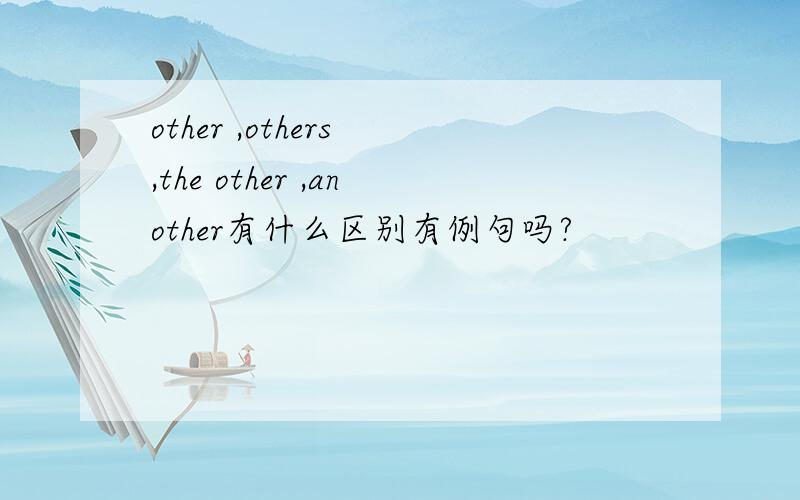other ,others ,the other ,another有什么区别有例句吗?
来源:学生作业帮助网 编辑:作业帮 时间:2024/11/17 09:39:09

other ,others ,the other ,another有什么区别有例句吗?
other ,others ,the other ,another有什么区别有例句吗?
other ,others ,the other ,another有什么区别有例句吗?
1
辨与析] the other,another,others,the others
the other意为the second of the two,指两者中的另一个,系特指,常与one连用.例如:
There are two kinds music in the world —— one is written down and the other is not.世界上有两种音乐,一种是用笔记录下来的,而另一种则不是.
The guard looked inside one boot,then the other.卫兵朝一只靴子里边瞧了瞧,然后又看另一只.
another意为one more或a different one,指三个以上的人或物中除去以知部分后“余下部分中的某一个”,非特指.例如:
I don’t like this pen.Please show me another.这支钢笔我不喜欢,请给我另外一支.
others意为some of the rest,所指的是三个以上的人或物中除去以知部分后“余下部分中的某一些”,非特指.
I don’t like these.Please let me see some others.我不喜欢这些,请另外给我一些瞧瞧.
When we talk with others we make ourselves understood not just by words.当我们与他人交谈时,并不仅仅靠语言来使别人了解你.
Ten of us are from Chongqingand others are from Chengdu.我们中间有10人来自重庆,其余的有些来自成都.(注:还有些来自成渝两地以外的地方.)
the others意为all of the rest,指三个以上的人或物中除去以知部分以后“余下部分中的全部”,系特指.例如:
Ten of us are from Chongqing,and the others are from Chengdu.我们中间有10人来自重庆,其余的(都)来自成都.(注:要么来自重庆,要么来自成都.)
Three of you go there,and the others stay here.你们之中有三个到那边去,其余的全待在这儿.
the other [简明英汉词典]
是其中的“另一个”,如:Give me the other one
not this one.给我那一个,不是这一个.
other [简明英汉词典]
adj.其他的,另外的,从前的
pron.其他的,他人,另外一个
adv.另外地,不同地
others [简明英汉词典]
和some对比使用时,是“有些”的意思而不是做“其他”讲.
the others [简明英汉词典]
是“其余的”意思,表示在一个范围内的其他全部,如:This dictionary is better than the others.这本字典比别[其余]的好.
another [简明英汉词典]
adj.另外的,又一,不同的
prep.另一个,另一个人,同类的东西
参考资料:baidu
1.the other +(one/单数名词)表示两者中的另一个
I have two books. One is an English boy,the other (one/book)is a Chinese book.
2. another + (one/单数名词)表示三者或三者以上中的另一个
This hat doesn't fit. I'd like to t...
全部展开
1.the other +(one/单数名词)表示两者中的另一个
I have two books. One is an English boy,the other (one/book)is a Chinese book.
2. another + (one/单数名词)表示三者或三者以上中的另一个
This hat doesn't fit. I'd like to try another.
He didn't return the book to me. Instead he borrowed another (one/book) from me.
Please give me another umbrella. This one is too old.
3. another 还可表示“又一的,再一个(或一批)的”与more 相似,但词序不同。
after another week又一星期之后 have another glass of milk 再喝一杯牛奶
--Would you like another cup?/Would you like one more cup?
你要不要再来一杯?
--No, I have had enough.不,我已经足够了
We need another ten chairs./We need ten more chairs
我们还/另外需要十张椅子。
4.others=other + 复数名词/ones “其余的/剩余的”指其余的/剩余的部分
the others=the other + 复数名词/ones“其余的/剩余的”指其余的/剩余的全部
These books are hers, and the other ones are mine.
She always thinks of other people/others and never thinks of herself.
她总是想到别人而从不考虑自己。
others和the other 和other还有another the others这几个词的用法
another, (the)other 和 (the) others都表示“另外的、别的”,但其意思及用法仍有所不同。
another和the other 都用来表示“另一个”。
(1) anther 指的是三个或三个以上的人或同类中的另一个,只能和单数名词连用。
(2) the other指已知的两个人或事物中的另一个,常和one搭配使用,构成one...the other句型,表示一个……另一个……。它和复数名词连用指“其他的……”。
(3) other 可用作形容词,修饰单、复数名词。
(4) others 通常可以做代词使用,比如:other students=others。
表示泛指,意为“其他的人或事物”,表示除了一部分以后的另一些,但不是剩下的全体,有列举未尽的意味在内,常和some搭配构成some...others句型。用做复数,表示一些……另一些。
(5) the others表示特指,意为“其他
1. (两个中的)另一个人(或物);另一方[the S]
It is hard to tell the twin brothers one from the other.
这对孪生兄弟很难辨认。
2. 其余的人(或物)
Some boys are reading; others are listening to the radio.
有些孩子在阅读,有些则在听收音机。
1. (两者中)另一个的;其余的
Her first-born is a doctor. Her other children are all in the army.
她的长子是医生,其余几个孩子都在部队服役。
1. 又一,再一
He drank another glass of beer.
他又喝了一杯啤酒.
the others表示范围内的另一些(范围总数通常多于两个个)后面不能加名词
There are 40 students in our class, three are American, the others are Chinese.
another / the other / other
这是一组近义词,都有“另外”的意思。
another 是“另一个”的意思,用于表示三个人(或三件东西)或三个以上的人(或东西)中的“另一个”时,可以作为形容词或代词。例如:
This glass is broken.Give me another,please.这个杯子破了,请给我另拿一个。(代词)(指在许多玻璃或不定数杯子中的一个。)
I’ll give you another example.我再给你举另一个例子吧。(形容词)
He’ll be back in another ten days.再过10天他就会回来了。(形容词)
the other指的是两个人或两件东西中的“另一个”。例如:
He has a book in one hand,and a pen in the other.他一只手拿着一本书,另一只手拿着一支钢笔。(人只有两只手。)
Where is the other glove?另外一只手套在哪儿?
注意:the other another都只能指单个人或物。
other 可以作为形容词或代词,表示“其他”、“另外”。当other作为形容词时,后面通常接复数名词,这是它与another的主要区别。例如:
We have Chinese,maths,English and other lessons today.今天我们上语文、数学、英语和其他课。
other 与数目字并用时,应注意以下区别及数目字与other的排列顺序。例如:
Give me two other books.(不能用Give me other two books.)给我(任何)两本别的书。
Give him the two other pens.(或者用Give him the other two pens.)给他其他那两支笔。
other 作为代词时,复数是others,表示“别的(人或物)”,“其余的(人或物)”。例如:
Of the four boys,one is in Grade One,the others are in Grade Two.在这四个男孩子中,一个是一年级,其他的(三个)是二年级。
注意:在这个例子中,“其他的”是确定的“三个”,所以要加定冠词,当others 泛指“旁人”时,不加定冠词。尤其在列举不定数的几群人或几种事物时,可以用some…,some…,others…的形式。例如:
There are different flowers there. Some are red, some are yellow,some are blue and others are whift.那儿有不同颜色的花。一些是红的,一些是黄的,一些是蓝的,其它的是白的。
There are a lot of children in the picture. Some are reading, some are watching TV and others are swimming in a river.画里有很多孩子。有些在看书,有些在看电视,其他的在河里游泳
收起